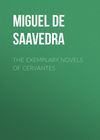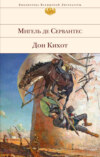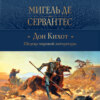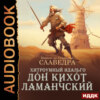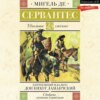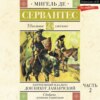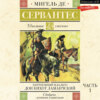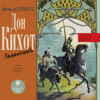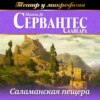Loe raamatut: «The Exemplary Novels of Cervantes»
PREFACE
It seems to be generally admitted that in rendering the title of a book from one language into another, the form of the original should be retained, even at the cost of some deviation from ordinary usage. Cicero's work De Officiis is never spoken of as a treatise on Moral Duties, but as Cicero's Offices. Upon the same principle we have not entitled the following collection of tales, Instructive or Moral; though it is in this sense that the author applied to them the epithet exemplares, as he states distinctly in his preface. The Spanish word exemplo, from the time of the archpriest of Hita and Don Juan Manuel, has had the meaning of instruction, or instructive story.
The "Novelas Exemplares" were first published in 1613, three years before the death of Cervantes. They are all original, and have the air of being drawn from his personal experience and observation. Ticknor, in his "History of Spanish Literature," says of them, and of the "Impertinent Curiosity," inserted in the first part of Don Quixote: —
"Their value is different, for they are written with different views, and in a variety of style greater than he has elsewhere shown; but most of them contain touches of what is peculiar in his talent, and are full of that rich eloquence and of those pleasing descriptions of natural scenery which always flow so easily from his pen. They have little in common with the graceful story-telling spirit of Boccaccio and his followers, and still less with the strictly practical tone of Don Juan Manuel's tales; nor, on the other hand, do they approach, except in the case of the 'Impertinent Curiosity,' the class of short novels which have been frequent in other countries within the last century. The more, therefore, we examine them, the more we shall find that they are original in their composition and general tone, and that they are strongly marked with the original genius of their author, as well as with the more peculiar traits of the national character, – the ground, no doubt, on which they have always been favourites at home, and less valued than they deserve to be abroad. As works of invention, they rank, among their author's productions, next after Don Quixote; in correctness and grace of style they stand before it… They are all fresh from the racy soil of the national character, as that character is found in Andalusia, and are written with an idiomatic richness, a spirit, and a grace, which, though they are the oldest tales of their class in Spain, have left them ever since without successful rivals."
The first three tales in this volume have merely undergone the revision of the editor, having been translated by another before he was engaged on the work. For the rest he alone is responsible.
W.K.K.
DEDICATION
TO DON PEDRO FERNANDEZ DE CASTRO, COUNT OF LEMOS, ANDRADE, AND VILLALBA, &c
Those who dedicate their works to some prince commonly fall into two errors. The first is, that in their dedicatory epistle, which ought to be brief and succinct, they dilate very complacently, whether moved by truth or flattery, on the deeds not only of their fathers and forefathers, but also of all their relations, friends, and benefactors. The second is, that they tell their patron they place their works under his protection and safeguard, in order that malicious and captious tongues may not presume to cavil and carp at them. For myself, shunning these two faults, I here pass over in silence the grandeur and titles of your excellency's ancient and royal house, and your infinite virtues both natural and acquired, leaving it to some new Phidias and Lysippus to engrave and sculpture them in marble and bronze, that they may rival time in duration. Neither do I supplicate your Excellency to take this book under your protection, for I know, that if it is not a good one, though I should put it under the wings of Astolfo's hippogrif, or beneath the club of Hercules, the Zoili, the cynics, the Aretinos, and the bores, will not abstain from abusing it, out of respect for anyone. I only beg your Excellency to observe that I present to you, without more words, thirteen tales,1 which, had they not been wrought in the laboratory of my own brains, might presume to stand beside the best. Such as they are, there they go, leaving me here rejoiced at the thought of manifesting, in some degree, the desire I feel to serve your Excellency as my true lord and benefactor. Our Lord preserve, &c.
Your Excellency's servant,
MIGUEL DE CERVANTES SAAVEDRA.
MADRID, 13th of July, 1613.
AUTHOR'S PREFACE
I wish it were possible, dear reader, to dispense with writing this preface; for that which I put at the beginning of my "Don Quixote" did not turn out so well for me as to give me any inclination to write another. The fault lies with a friend of mine – one of the many I have made in the course of my life with my heart rather than my head. This friend might well have caused my portrait, which the famous Don Juan de Jauregui would have given him, to be engraved and put in the first page of this book, according to custom. By that means he would have gratified my ambition and the wishes of several persons, who would like to know what sort of face and figure has he who makes bold to come before the world with so many works of his own invention. My friend might have written under the portrait – "This person whom you see here, with an oval visage, chestnut hair, smooth open forehead, lively eyes, a hooked but well-proportioned nose, & silvery beard that twenty years ago was golden, large moustaches, a small mouth, teeth not much to speak of, for he has but six, in bad condition and worse placed, no two of them corresponding to each other, a figure midway between the two extremes, neither tall nor short, a vivid complexion, rather fair than dark, somewhat stooped in the shoulders, and not very lightfooted: this, I say, is the author of 'Galatea,' 'Don Quixote de la Mancha,' 'The Journey to Parnassus,' which he wrote in imitation of Cesare Caporali Perusino, and other works which are current among the public, and perhaps without the author's name. He is commonly called MIGUEL DE CERVANTES SAAVEDRA. He was for many years a soldier, and for five years and a half in captivity, where he learned to have patience in adversity. He lost his left hand by a musket-shot in the battle of Lepanto: and ugly as this wound may appear, he regards it as beautiful, having received it on the most memorable and sublime occasion which past times have over seen, or future times can hope to equal, fighting under the victorious banners of the son of that thunderbolt of war, Charles V., of blessed memory." Should the friend of whom I complain have had nothing more to say of me than this, I would myself have composed a couple of dozen of eulogiums, and communicated them to him in secret, thereby to extend my fame and exalt the credit of my genius; for it would be absurd to expect the exact truth in such matters. We know well that neither praise nor abuse is meted out with strict accuracy.
However, since this opportunity is lost, and I am left in the lurch without a portrait, I must have recourse to my own tongue, which, for all its stammering, may do well enough to state some truths that are tolerably self-evident. I assure you then, dear reader, that you can by no means make a fricassee of these tales which I here present to you, for they have neither legs, head, bowels, nor anything of the sort; I mean that the amorous intrigues you will find in some of them, are so decorous, so measured, and so conformable to reason and Christian propriety, that they are incapable of exciting any impure thoughts in him who reads them with or without caution.
I have called them exemplary, because if you rightly consider them, there is not one of them from which you may not draw some useful example; and were I not afraid of being too prolix, I might show you what savoury and wholesome fruit might be extracted from them, collectively and severally.
My intention has been to set up, in the midst of our community, a billiard-table, at which every one may amuse himself without hurt to body and soul; for innocent recreations do good rather than harm. One cannot be always at church, or always saying one's prayers, or always engaged in one's business, however important it may be; there are hours for recreation when the wearied mind should take repose. It is to this end that alleys of trees are planted to walk in, waters are conveyed from remote fountains, hills are levelled, and gardens are cultivated with such care. One thing I boldly declare: could I by any means suppose that these novels could excite any bad thought or desire in those who read them, I would rather cut off the hand with which I write them, than give them to the public. I am at an age when it does not become me to trifle with the life to come, for I am upwards of sixty-four.
My genius and my inclination prompt me to this kind of writing; the more so as I consider (and with truth) that I am the first who has written novels in the Spanish language, though many have hitherto appeared among us, all of them translated from foreign authors. But these are my own, neither imitated nor stolen from anyone; my genius has engendered them, my pen has brought them forth, and they are growing up in the arms of the press. After them, should my life be spared, I will present to you the Adventures of Persiles, a book which ventures to compete with Heliodorus. But previously you shall see, and that before long, the continuation of the exploits of Don Quixote and the humours of Sancho Panza; and then the Weeks of the Garden. This is promising largely for one of my feeble powers; but who can curb his desires? I only beg you to remark that since I have had the boldness to address these novels to the great Count of Lemos, they must contain some hidden mystery which exalts their merit.
I have no more to say, so pray God to keep you, and give me patience to bear all the ill that will be spoken of me by more than one subtle and starched critic. Vale.
THE LADY CORNELIA
Don Antonio de Isunza and Don Juan de Gamboa, gentlemen of high birth and excellent sense, both of the same age, and very intimate friends, being students together at Salamanca, determined to abandon their studies and proceed to Flanders. To this resolution they were incited by the fervour of youth, their desire to see the world, and their conviction that the profession of arms, so becoming to all, is more particularly suitable to men of illustrious race.
But they did not reach Flanders until peace was restored, or at least on the point of being concluded; and at Antwerp they received letters from their parents, wherein the latter expressed the great displeasure caused them by their sons having left their studies without informing them of their intention, which if they had done, the proper measures might have been taken for their making the journey in a manner befitting their birth and station.
Unwilling to give further dissatisfaction to their parents, the young men resolved to return to Spain, the rather as there was now nothing to be done in Flanders. But before doing so they determined to visit all the most renowned cities of Italy; and having seen the greater part of them, they were so much attracted by the noble university of Bologna, that they resolved to remain there and complete the studies abandoned at Salamanca.
They imparted their intentions to their parents, who testified their entire approbation by the magnificence with which they provided their sons with every thing proper to their rank, to the end that, in their manner of living, they might show who they were, and of what house they were born. From the first day, therefore, that the young men visited the schools, all perceived them to be gallant, sensible, and well-bred gentlemen.
Don Antonio was at this time in his twenty-fourth year, and Don Juan had not passed his twenty-sixth. This fair period of life they adorned by various good qualities; they were handsome, brave, of good address, and well versed in music and poetry; in a word, they were endowed with such advantages as caused them to be much sought and greatly beloved by all who knew them. They soon had numerous friends, not only among the many Spaniards belonging to the university,2 but also among people of the city, and of other nations, to all of whom they proved themselves courteous, liberal, and wholly free from that arrogance which is said to be too often exhibited by Spaniards.
Being young, and of joyous temperament, Don Juan and Don Antonio did not fail to give their attention to the beauties of the city. Many there were indeed in Bologna, both married and unmarried, remarkable as well for their virtues as their charms; but among them all there was none who surpassed the Signora Cornelia Bentivoglia, of that old and illustrious family of the Bentivogli, who were at one time lords of Bologna.
Cornelia was beautiful to a marvel; she had been left under the guardianship of her brother Lorenzo Bentivoglio, a brave and honourable gentleman. They were orphans, but inheritors of considerable wealth – and wealth is a great alleviation of the evils of the orphan state. Cornelia lived in complete seclusion, and her brother guarded her with unwearied solicitude. The lady neither showed herself on any occasion, nor would her brother consent that any one should see her; but this very fact inspired Don Juan and Don Antonio with the most lively desire to behold her face, were it only at church. Yet all the pains they took for that purpose proved vain, and the wishes they had felt on the subject gradually diminished, as the attempt appeared more and more hopeless. Thus, devoted to their studies, and varying these with such amusements as are permitted to their age, the young men passed a life as cheerful as it was honourable, rarely going out at night, but when they did so, it was always together and well armed.
One evening, however, when Don Juan was preparing to go out, Don Antonio expressed his desire to remain at home for a short time, to repeat certain orisons: but he requested Don Juan to go without him, and promised to follow him.
"Why should I go out to wait for you?" said Don Juan. "I will stay; if you do not go out at all to-night, it will be of very little consequence." "By no means shall you stay," returned Don Antonio: "go and take the air; I will be with you almost immediately, if you take the usual way."
"Well, do as you please," said Don Juan: "if you come you will find me on our usual beat." With these words Don Juan left the house.
The night was dark, and the hour about eleven. Don Juan passed through two or three streets, but finding himself alone, and with no one to speak to, he determined to return home. He began to retrace his steps accordingly; and was passing through a street, the houses of which had marble porticoes, when he heard some one call out, "Hist! hist!" from one of the doors. The darkness of the night, and the shadow cast by the colonnade, did not permit him to see the whisperer; but he stopped at once, and listened attentively. He saw a door partially opened, approached it, and heard these words uttered in a low voice, "Is it you, Fabio?" Don Juan, on the spur of the moment, replied, "Yes!" "Take it, then," returned the voice, "take it, and place it in security; but return instantly, for the matter presses." Don Juan put out his hand in the dark, and encountered a packet. Proceeding to take hold of it, he found that it required both hands; instinctively he extended the second, but had scarcely done so before the portal was closed, and he found himself again alone in the street, loaded with, he knew not what.
Presently the cry of an infant, and, as it seemed, but newly born, smote his ears, filling him with confusion and amazement, for he knew not what next to do, or how to proceed in so strange a case. If he knocked at the door he was almost certain to endanger the mother of the infant; and if he left his burthen there, he must imperil the life of the babe itself. But if he took it home he should as little know what to do with it, nor was he acquainted with any one in the city to whom he could entrust the care of the child; yet remembering that he had been required to come back quickly, after placing his charge in safety, he determined to take the infant home, leave it in the hands of his old housekeeper, and return to see if his aid was needed in any way, since he perceived clearly that the person who had been expected to come for the child had not arrived, and the latter had been given to himself in mistake. With this determination, Don Juan soon reached his home; but found that Antonio had already left it. He then went to his chamber, and calling the housekeeper, uncovered the infant, which was one of the most beautiful ever seen; whilst, as the good woman remarked, the elegance of the clothes in which the little creature was wrapped, proved him – for it was a boy – to be the son of rich parents.
"You must, now," said Don Juan to his housekeeper, "find some one to nurse this infant; but first of all take away these rich coverings, and put on him others of the plainest kind. Having done that, you must carry the babe, without a moment's delay, to the house of a midwife, for there it is that you will be most likely to find all that is requisite in such a case. Take money to pay what may be needful, and give the child such parents as you please, for I desire to hide the truth, and not let the manner in which I became possessed of it be known." The woman promised that she would obey him in every point; and Don Juan returned in all haste to the street, to see whether he should receive another mysterious call. But just before he arrived at the house whence the infant had been delivered to him, the clash of swords struck his ear, the sound being as that of several persons engaged in strife. He listened carefully, but could hear no word; the combat was carried on in total silence; but the sparks cast up by the swords as they struck against the stones, enabled him to perceive that one man was defending himself against several assailants; and he was confirmed in this belief by an exclamation which proceeded at length from the last person attacked. "Ah, traitors! you are many and I am but one, yet your baseness shall not avail you."
Hearing and seeing this, Don Juan, listening only to the impulses of his brave heart, sprang to the side of the person assailed, and opposing the buckler he carried on his arm to the swords of the adversaries, drew his own, and speaking in Italian that he might not be known as a Spaniard, he said – "Fear not, Signor, help has arrived that will not fail you while life holds; lay on well, for traitors are worth but little however many there may be." To this, one of the assailants made answer – "You lie; there are no traitors here. He who seeks to recover his lost honour is no traitor, and is permitted to avail himself of every advantage."
No more was said on either side, for the impetuosity of the assailants, who, as Don Juan thought, amounted to not less than six, left no opportunity for further words. They pressed his companion, meanwhile, very closely; and two of them giving him each a thrust at the same time with the point of their swords, he fell to the earth. Don Juan believed they had killed him; he threw himself upon the adversaries, nevertheless, and with a shower of cuts and thrusts, dealt with extraordinary rapidity, caused them to give way for several paces. But all his efforts must needs have been vain for the defence of the fallen man, had not Fortune aided him, by making the neighbours come with lights to their windows and shout for the watch, whereupon the assailants ran off and left the street clear.
The fallen man was meanwhile beginning to move; for the strokes he had received, having encountered a breastplate as hard as adamant, had only stunned, but not wounded him.
Now, Don Juan's hat had been knocked off in the fray, and thinking he had picked it up, he had in fact put on that of another person, without perceiving it to be other than his own. The gentleman whom he had assisted now approached Don Juan, and accosted him as follows: – "Signor Cavalier, whoever you may be, I confess that I owe you my life, and I am bound to employ it, with all I have or can command, in your service: do me the favour to tell me who you are, that I may know to whom my gratitude is due."
"Signor," replied Don Juan, "that I may not seem discourteous, and in compliance with your request, although I am wholly disinterested in what I have done, you shall know that I am a Spanish gentleman, and a student in this city; if you desire to hear my name I will tell you, rather lest you should have some future occasion for my services than for any other motive, that I am called Don Juan de Gamboa."
"You have done me a singular service, Signor Don Juan de Gamboa," replied the gentleman who had fallen, "but I will not tell you who I am, nor my name, which I desire that you should learn from others rather than from myself; yet I will take care that you be soon informed respecting these things."
Don Juan then inquired of the stranger if he were wounded, observing, that he had seen him receive two furious lunges in the breast; but the other replied that he was unhurt; adding, that next to God, a famous plastron that he wore had defended him against the blows he had received, though his enemies would certainly have finished him had Don Juan not come to his aid.
While thus discoursing, they beheld a body of men advancing towards them; and Don Juan exclaimed – "If these are enemies, Signor, let us hasten to put ourselves on our guard, and use our hands as men of our condition should do."
"They are not enemies, so far as I can judge," replied the stranger. "The men who are now coming towards us are friends."
And this was the truth; the persons approaching, of whom there were eight, surrounded the unknown cavalier, with whom they exchanged a few words, but in so low a tone that Don Juan could not hear the purport. The gentleman then turned to Don Juan and said – "If these friends had not arrived I should certainly not have left your company, Signor Don Juan, until you had seen me in some place of safety; but as things are, I beg you now, with all kindness, to retire and leave me in this place, where it is of great importance that I should remain." Speaking thus, the stranger carried his hand to his head, but finding that he was without a hat, he turned towards the persons who had joined him, desiring them to give him one, and saying that his own had fallen. He had no sooner spoken than Don Juan presented him with that which he had himself just picked up, and which he had discovered to be not his own. The stranger having felt the hat, returned it to Don Juan, saying that it was not his, and adding, "On your life, Signor Don Juan, keep this hat as a trophy of this affray, for I believe it to be one that is not unknown."
The persons around then gave the stranger another hat, and Don Juan, after exchanging a few brief compliments with his companion, left him, in compliance with his desire, without knowing who he was: he then returned home, not daring at that moment to approach the door whence he had received the newly-born infant, because the whole neighbourhood had been aroused, and was in movement.
Now it chanced that as Don Juan was returning to his abode, he met his comrade Don Antonio de Isunza; and the latter no sooner recognised him in the darkness, than he exclaimed, "Turn about, Don Juan, and walk with me to the end of the street; I have something to tell you, and as we go along will relate a story such as you have never heard before in your life."
"I also have one of the same kind to tell you," returned Don Juan, "but let us go up the street as you say, and do you first relate your story." Don Antonio thereupon walked forward, and began as follows: – "You must know that in little less than an hour after you had left the house, I left it also, to go in search of you, but I had not gone thirty paces from this place when I saw before me a black mass, which I soon perceived to be a person advancing in great haste. As the figure approached nearer, I perceived it to be that of a woman, wrapped in a very wide mantle, and who, in a voice interrupted by sobs and sighs, addressed me thus, 'Are you, sir, a stranger, or one of the city?' 'I am a stranger,' I replied, 'and a Spaniard.' 'Thanks be to God!' she exclaimed, 'he will not have me die without the sacraments.' 'Are you then wounded, madam?' continued I, 'or attacked by some mortal malady?' 'It may well happen that the malady from which I suffer may prove mortal, if I do not soon receive aid,' returned the lady, 'wherefore, by the courtesy which is ever found among those of your nation, I entreat you, Signor Spaniard, take me from these streets, and lead me to your dwelling with all the speed you may; there, if you wish it, you shall know the cause of my sufferings, and who I am, even though it should cost me my reputation to make myself known.'
"Hearing this," continued Don Antonio, "and seeing that the lady was in a strait which permitted no delay, I said nothing more, but offering her my hand, I conducted her by the by-streets to our house. Our page, Santisteban, opened the door, but, commanding him to retire, I led the lady in without permitting him to see her, and took her into my room, where she had no sooner entered than she fell fainting on my bed. Approaching to assist her, I removed the mantle which had hitherto concealed her face, and discovered the most astonishing loveliness that human eyes ever beheld. She may be about eighteen years old, as I should suppose, but rather less than more. Bewildered for a moment at the sight of so much beauty, I remained as one stupified, but recollecting myself, I hastened to throw water on her face, and, with a pitiable sigh, she recovered consciousness.
"The first word she uttered was the question, 'Do you know me, Signor?' I replied, 'No, lady! I have not been so fortunate as ever before to have seen so much beauty.' 'Unhappy is she,' returned the lady, 'to whom heaven has given it for her misfortune. But, Signor, this is not the time to praise my beauty, but to mourn my distress. By all that you most revere, I entreat you to leave me shut up here, and let no one behold me, while you return in all haste to the place where you found me, and see if there be any persons fighting there. Yet do not take part either with one side or the other. Only separate the combatants, for whatever injury may happen to either, must needs be to the increase of my own misfortunes.' I then left her as she desired," continued Don Antonio, "and am now going to put an end to any quarrel which may arise, as the lady has commanded me."
"Have you anything more to say?" inquired Don Juan.
"Do you think I have not said enough," answered Don Antonio, "since I have told you that I have now in my chamber, and hold under my key, the most wonderful beauty that human eyes have ever beheld."
"The adventure is a strange one, without doubt," replied Don Juan, "but listen to mine;" and he instantly related to his friend all that had happened to him. He told how the newly-born infant was then in their house, and in the care of their housekeeper, with the orders he had given as to changing its rich habits for others less remarkable, and for procuring a nurse from the nearest midwife, to meet the present necessity. "As to the combat you come in quest of," he added, "that is already ended, and peace is made." Don Juan further related that he had himself taken part in the strife; and concluded by remarking, that he believed those whom he had found engaged were all persons of high quality, as well as great courage.
Each of the Spaniards was much surprised at the adventure of the other, and they instantly returned to the house to see what the lady shut up there might require. On the way, Don Antonio told Don Juan that he had promised the unknown not to suffer any one to see her; assuring her that he only would enter the room, until she should herself permit the approach of others.
"I shall nevertheless do my best to see her," replied Don Juan; "after what you have said of her beauty, I cannot but desire to do so, and shall contrive some means for effecting it."
Saying this they arrived at their house, when one of their three pages, bringing lights, Don Antonio cast his eyes on the hat worn by Don Juan, and perceived that it was glittering with diamonds. Don Juan took it off, and then saw that the lustre of which his companion spoke, proceeded from a very rich band formed of large brilliants. In great surprise, the friends examined the ornament, and concluded that if all the diamonds were as precious as they appeared to be, the hat must be worth more than two thousand ducats. They thus became confirmed in the conviction entertained by Don Juan, that the persons engaged in the combat were of high quality, especially the gentleman whose part he had taken, and who, as he now recollected, when bidding him take the hat, and keep it, had remarked that it was not unknown.
The young men then commanded their pages to retire, and Don Antonio, opening the door of his room, found the lady seated on his bed, leaning her cheek on her hand, and weeping piteously. Don Juan also having approached the door, the splendour of the diamonds caught the eye of the weeping lady, and she exclaimed, "Enter, my lord duke, enter! Why afford me in such scanty measure the happiness of seeing you; enter at once, I beseech you."
"Signora," replied Don Antonio, "there is no duke here who is declining to see you."
"How, no duke!" she exclaimed. "He whom I have just seen is the Duke of Ferrara; the rich decoration of his hat does not permit him to conceal himself."
